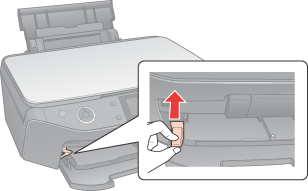 |
 |
|
||
 |
||||
Diagnosing the Problem
Troubleshooting printer problems is best handled in two steps: first diagnose the problem, then apply likely solutions until the problem is fixed.
The information that you need to diagnose and solve most common problems is provided by online problem solving, the control panel, the EPSON Status Monitor utility, or by running a printer operation check. Refer to the appropriate section below.
If you have a specific problem relating to print quality, a printout problem not related to print quality, or a paper feeding problem, or if the printer does not print at all, refer to the appropriate section.
Error indicators
You can identify many common printer problems by checking the error indicators on the printer's control panel. If the printer stops working and you cannot solve the problems, see the table of error indicators and solutions provided in the booklet.
EPSON Status Monitor (for Windows only)
If a problem occurs while printing, an error message will appear in the Status Monitor window.
When you need to replace an ink cartridge, click the How To button on the window, and EPSON Status Monitor will lead you step-by-step through the cartridge replacement procedure.
If an error message appears indicating the parts inside the printer are near the end of their service life, the waste ink pad in the printer is saturated. Contact your dealer to replace it.
 Note:
Note:|
When you use your printer as a shared printer on a network with the following combinations of computers, the client operating systems are not able to communicate with the printer, so that some functions are not available for that particular client.
|
Running a printer operation check
If you are unable to determine the source of the problem, run a printer operation check to help you determine whether the problem comes from the printer or your computer.
Before running a printer operation check, make sure the front tray is in the paper position (lower position). If it is not, move the tray lever up and reposition the front tray.

 Caution:
Caution:|
Do not touch the front tray when operating the tray lever.
Do not move the tray lever while the printer is operating.
|
 Note:
Note:|
Before you move the tray lever, make sure no paper or other objects are on the front tray and the front tray is not extended.
|
To run a printer operation check, follow these steps.
 |
Make sure both the printer and computer are turned off.
|
 |
Disconnect the cable from the interface connector of the printer.
|
 |
Make sure that A4 size paper is loaded in the sheet feeder, the CD/DVD tray is not inserted in the printer, and that the front tray is in the paper position.
|
 |
Press the
 On button to turn on the printer. On button to turn on the printer. |
 |
Press the
 [Setup] button to enter the Setup mode. [Setup] button to enter the Setup mode. |
 |
Press the
 or or  button to select Maintenance, then press the OK button. button to select Maintenance, then press the OK button. |
 |
Press the
 or or  button to highlight Nozzle Check, press the OK button, and then press the button to highlight Nozzle Check, press the OK button, and then press the  Start button. Start button. |
A test page prints showing a nozzle check pattern. If the pattern has gaps, you need to clean the print head.
 See Cleaning the Print Head
See Cleaning the Print Head
 See Cleaning the Print Head
See Cleaning the Print Head
If the test page prints, the problem probably lies in your software settings, the cable, or your computer. It is also possible that your software may not be installed correctly. Try uninstalling your software and reinstalling it.
 See Uninstalling the Printer Software
See Uninstalling the Printer Software
 See Uninstalling the Printer Software
See Uninstalling the Printer Software
If the test page does not print, you may have a problem with your printer. Try the suggestions in the following section.
 See The Printer Does Not Print
See The Printer Does Not Print
 See The Printer Does Not Print
See The Printer Does Not Print
